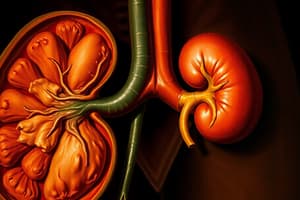Podcast
Questions and Answers
What is one primary function of the kidneys related to blood pressure regulation?
What is one primary function of the kidneys related to blood pressure regulation?
- Absorption of sodium
- Secretion of renin (correct)
- Secretion of erythropoietin
- Filtration of red blood cells
During the filtration process in the nephrons, what is formed after blood is filtered through the glomerulus?
During the filtration process in the nephrons, what is formed after blood is filtered through the glomerulus?
- Plasma
- Renin
- Filtrate (correct)
- Urine
In the nephron, which structure is primarily responsible for the reabsorption of water and small molecules?
In the nephron, which structure is primarily responsible for the reabsorption of water and small molecules?
- Collecting duct
- Proximal tubule (correct)
- Distal tubule
- Loop of Henle
What happens to drug active ingredients that are bound to plasma proteins during the filtration process?
What happens to drug active ingredients that are bound to plasma proteins during the filtration process?
Which of the following conditions is a leading cause of chronic kidney disease (CKD)?
Which of the following conditions is a leading cause of chronic kidney disease (CKD)?
What could be a potential risk of administering an average medication dose to a patient with renal failure?
What could be a potential risk of administering an average medication dose to a patient with renal failure?
Which of the following tests is most indicative of kidney function decline when elevated?
Which of the following tests is most indicative of kidney function decline when elevated?
How does hydration status affect blood urea nitrogen (BUN) levels?
How does hydration status affect blood urea nitrogen (BUN) levels?
What would an elevated BUN level combined with a normal creatinine level suggest about a patient's condition?
What would an elevated BUN level combined with a normal creatinine level suggest about a patient's condition?
What diagnostic test involves taking tissue from the kidney to assess for damage?
What diagnostic test involves taking tissue from the kidney to assess for damage?
Flashcards are hidden until you start studying
Study Notes
Kidney Functions
- Fluid & Electrolyte Balance: Kidneys regulate the amount of water and electrolytes in the body through reabsorption and secretion processes.
- Acid-Base Balance: Kidneys maintain the correct pH balance in the blood by excreting excess acids or bases.
- Red Blood Cell Production (Erythropoiesis): Kidneys produce erythropoietin, a hormone that stimulates red blood cell production in the bone marrow.
- Blood Pressure Regulation: Kidneys secrete renin, an enzyme that plays a crucial role in regulating blood pressure.
Nephron: The Functional Unit of the Kidney
- Filtration: Blood enters the nephron and is filtered through the glomerulus.
- Reabsorption: Water and small molecules such as glucose, amino acids, sodium, chloride, calcium, and bicarbonate are reabsorbed back into the bloodstream.
- Secretion: Substances like potassium, phosphate, hydrogen, ammonium, and some acidic drugs are secreted into the filtrate.
- Loop of Henle: Solely responsible for reabsorption processes within the nephron.
Renal Failure (Chronic Kidney Disease - CKD)
- Reduced Kidney Function: Characterized by a decrease in the kidney's ability to function properly.
- Common Causes: Uncontrolled hypertension and diabetes mellitus are leading causes of CKD.
- Drug Accumulation: Drugs can accumulate to high levels in the body due to impaired kidney function.
- Dosage Adjustments: Medication dosages may need adjustment to compensate for reduced kidney function.
Renal Failure
- Renal failure is a decrease in the kidneys' ability to function.
- Untreated hypertension and diabetes mellitus are leading causes.
- Drug accumulation to high levels is a consequence of renal failure.
- Medication dosages may need to be adjusted in patients with renal failure.
- Administering an average dose to a person with renal failure can be fatal.
Diagnosis of Renal Failure
- Urinalysis is a diagnostic tool for renal failure.
- Serum creatinine levels rise when the kidneys don't process or eliminate creatinine effectively, indicating impaired kidney function.
- Blood urea nitrogen (BUN) levels are influenced by factors like hydration status.
- Dehydration can lead to concentrated blood, resulting in elevated BUN levels.
- Overhydration can lead to diluted blood, resulting in lower BUN levels.
- If a patient's creatinine is normal but BUN is high, it may suggest dehydration and kidney failure.
- Diagnostic imaging can assist in diagnosing renal failure.
- Renal biopsy offers a definitive diagnosis of renal failure.
Studying That Suits You
Use AI to generate personalized quizzes and flashcards to suit your learning preferences.




